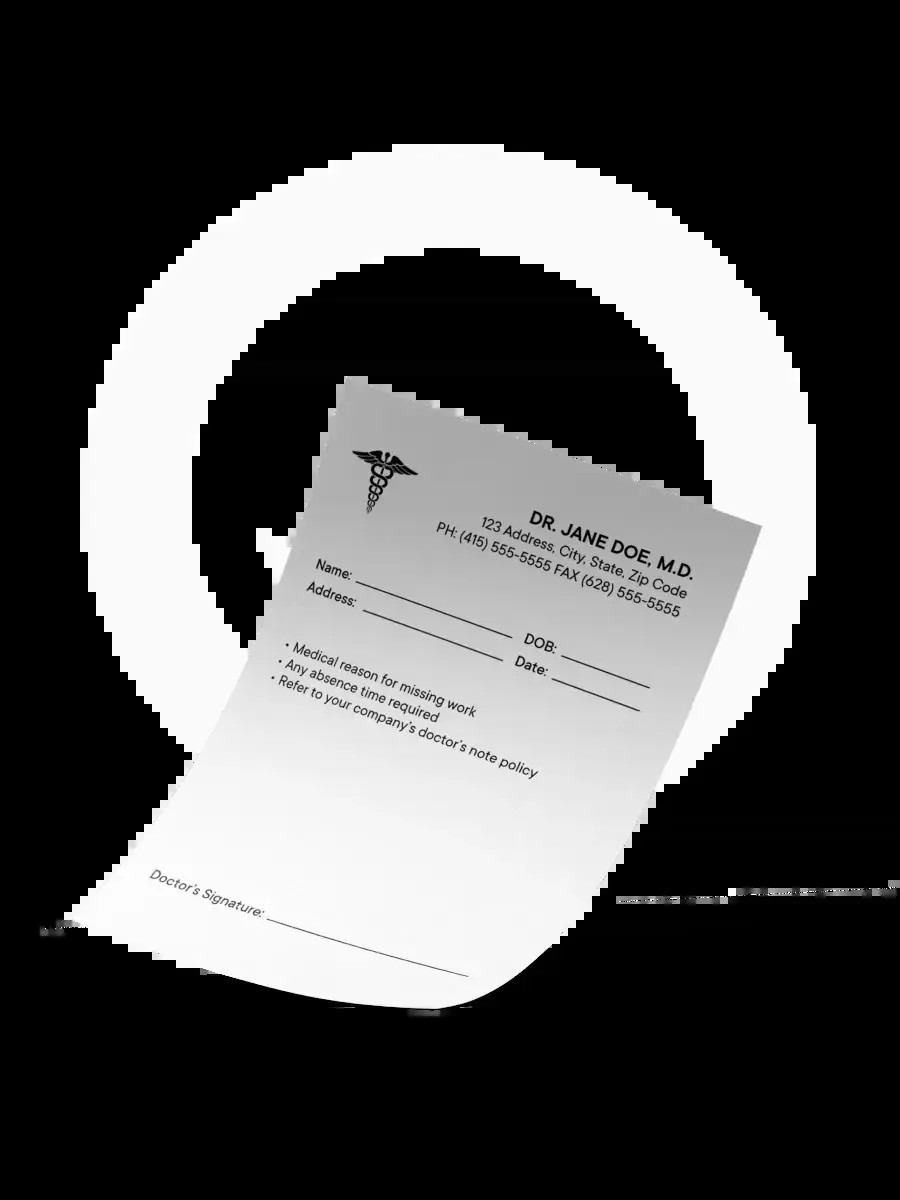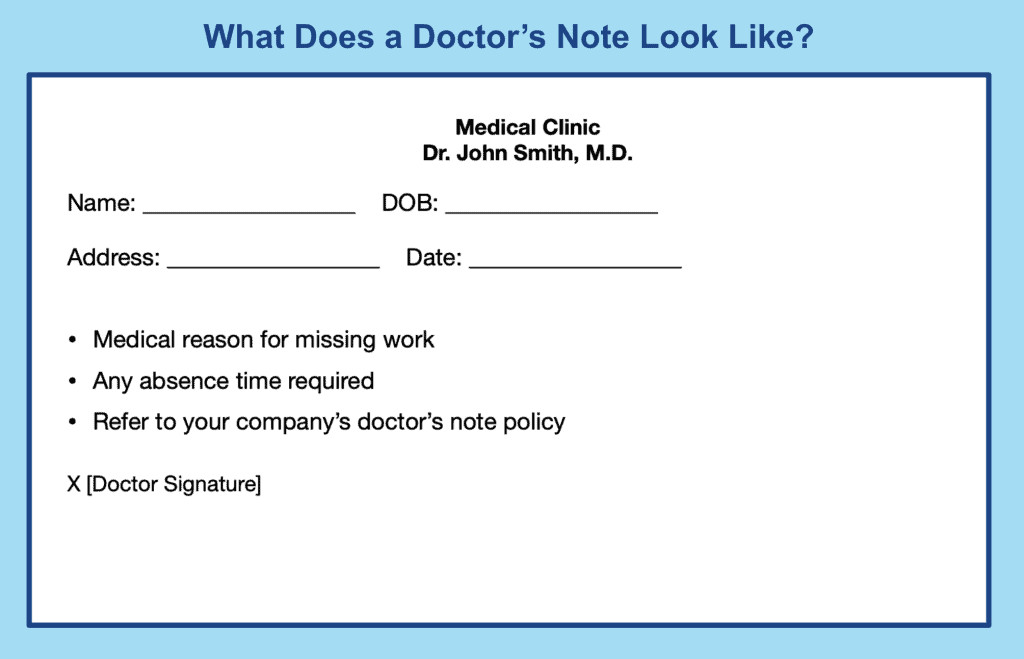Can I fake a doctor’s note for work? No, faking a doctor’s note for work is illegal and unethical, and it is always best to obtain a legitimate note from a healthcare provider; at thebootdoctor.net, we understand the need for valid documentation when medical issues affect your ability to work. This comprehensive guide explores the implications of falsifying medical documents and provides reliable alternatives, including how to obtain a genuine doctor’s note and ways to manage your health effectively. Learn about the importance of honest health reporting and how to ensure your workplace understands your medical needs through verifiable documentation. We’ll also cover medical leave, telemedicine, and worker’s rights.
1. Understanding the Implications of Faking a Doctor’s Note
1.1. What Constitutes a Fake Doctor’s Note?
A fake doctor’s note is any document presented as a medical excuse that is not genuinely issued by a licensed healthcare provider, which includes altering a legitimate note, using a template with false information, or creating a completely fabricated document. These notes are intended to falsely represent a medical appointment or condition.
1.2. Is Faking a Doctor’s Note Illegal?
Yes, faking a doctor’s note can lead to legal repercussions depending on the jurisdiction and the intent behind the forgery. Forging a document, especially one intended to deceive an employer or educational institution, can be classified as fraud, potentially leading to fines, legal charges, and a criminal record.
1.3. Ethical Considerations
Beyond the legal implications, using a fake doctor’s note raises ethical concerns regarding honesty and integrity in the workplace and academic settings. Employers and educators rely on the truthfulness of these documents to manage attendance and accommodations fairly.
2. Legal Consequences of Forging a Doctor’s Note
2.1. Potential Legal Charges
Forging a doctor’s note can result in various legal charges, including:
| Legal Charge | Description |
|---|---|
| Fraud | Misrepresenting facts to gain an advantage |
| Forgery | Falsifying a legal document |
| Deceit | Intentionally misleading another party |
2.2. Penalties for Forgery
The penalties for forgery vary by state but often include fines, probation, community service, and even imprisonment, particularly if the forgery is part of a larger scheme. The seriousness of the penalty typically depends on the value of what was fraudulently obtained and the person’s prior criminal record.
2.3. Impact on Employment and Academic Standing
Besides legal penalties, using a fake doctor’s note can lead to severe consequences in your professional or academic life. Employers may terminate your employment upon discovering the deception, while educational institutions can suspend or expel students.
3. Why You Shouldn’t Fake a Doctor’s Note
3.1. Trust and Credibility
Submitting a fake doctor’s note can irreparably damage your reputation. Once trust is broken, it’s challenging to regain the confidence of your employer, colleagues, or educators.
3.2. Job Security
Most companies have strict policies against dishonesty, and providing falsified documents is often grounds for immediate termination. This can not only affect your current job but also your future employment prospects, as the incident may be noted in employment records.
3.3. Academic Repercussions
In academic settings, submitting a forged doctor’s note can lead to failing grades, suspension, or expulsion. This can derail your education and impact your future career opportunities.
4. Understanding Legitimate Reasons for a Doctor’s Note
4.1. Medical Appointments
A legitimate doctor’s note confirms that you attended a medical appointment, which is essential for excusing absences from work or school. Regular check-ups, specialist visits, and emergency treatments all qualify.
4.2. Illness and Injury
When illness or injury prevents you from performing your duties at work or school, a doctor’s note serves as official documentation to justify your absence, allowing you time to recover without penalty.
4.3. Extended Medical Leave
For medical conditions that require a more extended period of absence, a doctor’s note can support your request for medical leave under programs like the Family and Medical Leave Act (FMLA), protecting your job while you recover.
5. How to Obtain a Real Doctor’s Note
5.1. Visiting a Primary Care Physician
Consulting with your primary care physician is the most traditional way to obtain a doctor’s note. They can assess your condition, provide treatment, and offer a valid excuse for your absence.
5.2. Using Urgent Care Services
Urgent care centers are a convenient option for immediate medical needs that are not life-threatening. They can provide doctor’s notes for unexpected illnesses or injuries that require immediate attention.
5.3. Telemedicine Options
Telemedicine offers a modern approach to obtaining doctor’s notes. Online platforms like PlushCare connect you with licensed physicians who can evaluate your symptoms remotely and provide a doctor’s note if necessary.
5.4. Steps to Requesting a Doctor’s Note
| Step | Description |
|---|---|
| Schedule an Appointment | Book a visit with a healthcare provider, either in-person or online |
| Describe Your Symptoms | Clearly explain your medical issues and why you need the note |
| Request the Note | Ask the doctor to provide a formal note for your employer or school |
| Verify the Details | Ensure the note includes all necessary information, such as dates, reasons for absence, and the doctor’s signature |
6. What Information Should Be Included in a Doctor’s Note?
6.1. Essential Elements
A valid doctor’s note typically includes the following:
- Date of the appointment
- Patient’s name
- A brief description of the medical condition or reason for the visit
- Recommended period of absence from work or school
- Doctor’s signature and contact information
6.2. Privacy Considerations
While a doctor’s note needs to provide enough information to validate your absence, it should also protect your privacy. Due to HIPAA regulations, the note should only include necessary details without disclosing confidential medical information unless you provide explicit consent.
7. Managing Workplace Absences Effectively
7.1. Communicating with Your Employer
Open and honest communication with your employer is crucial. Inform them of your medical situation as soon as possible and provide updates on your expected return date.
7.2. Understanding Company Policies
Familiarize yourself with your company’s policies regarding sick leave, medical leave, and required documentation. This knowledge helps you comply with the rules and avoid misunderstandings.
7.3. Utilizing Available Resources
Take advantage of any resources your employer offers, such as employee assistance programs (EAPs) or health and wellness initiatives, which can provide support during medical situations.
8. Alternatives to Faking a Doctor’s Note
8.1. Honest Communication
Sometimes, simply explaining your situation to your employer or teacher can be sufficient. Many are understanding and willing to work with you, especially if you have a history of reliability.
8.2. Requesting a Personal Day
If you need time off for personal reasons but don’t qualify for sick leave, consider requesting a personal day. This allows you to take time off without providing a medical excuse.
8.3. Utilizing Telehealth Services
Telehealth services offer a convenient way to address minor health issues and obtain necessary documentation without the hassle of an in-person visit, making it a reliable alternative to faking a note.
9. The Role of Telemedicine in Obtaining Legitimate Notes
9.1. Convenience and Accessibility
Telemedicine offers unparalleled convenience, allowing you to consult with a doctor from the comfort of your home. This is particularly beneficial if you live in a remote area or have mobility issues.
9.2. Cost-Effectiveness
Online consultations are often more affordable than traditional in-person visits, reducing the financial burden of obtaining a doctor’s note.
9.3. Quick Turnaround
With telemedicine, you can often schedule an appointment and receive a doctor’s note within the same day, making it a quick and efficient option for urgent situations.
10. How thebootdoctor.net Supports Your Foot Health Needs
At thebootdoctor.net, we understand the importance of maintaining good foot health to prevent issues that might require a doctor’s visit. Our resources can help you proactively care for your feet.
10.1. Expert Advice on Foot Care
We provide detailed articles and guides on various foot conditions, treatments, and preventive measures. Our content is designed to help you understand and manage your foot health effectively.
10.2. Recommendations for Proper Footwear
Choosing the right footwear is crucial for preventing foot problems. We offer expert recommendations on selecting shoes that provide adequate support and comfort for different activities and conditions.
10.3. Resources for Managing Foot Conditions
From plantar fasciitis to bunions, we offer resources for managing a wide range of foot conditions. Our guides include information on exercises, stretches, and other self-care techniques that can help alleviate symptoms and improve your quality of life.
 Woman Massaging Her Foot
Woman Massaging Her Foot
11. Real-Life Scenarios: Ethical Choices vs. Falsification
11.1. Case Study 1: Managing a Cold
Scenario: You have a mild cold but need to attend an important meeting at work.
Ethical Choice: Use over-the-counter remedies, maintain good hygiene, and inform your employer about your condition. If symptoms worsen, consult a doctor via telemedicine and obtain a legitimate note if needed.
Falsification: Faking a doctor’s note to stay home without seeing a doctor.
11.2. Case Study 2: Dealing with a Foot Injury
Scenario: You injured your foot and need time to recover but are concerned about taking too much time off.
Ethical Choice: Consult a doctor, follow their advice, and provide your employer with a genuine doctor’s note explaining your condition and recovery plan.
Falsification: Creating a fake note to extend your leave beyond what is medically necessary.
11.3. Case Study 3: Handling a Family Emergency
Scenario: A family emergency requires you to take time off work unexpectedly.
Ethical Choice: Communicate openly with your employer about the situation and explore options such as personal days or family leave, providing any necessary documentation as required.
Falsification: Faking a doctor’s note to cover your absence instead of explaining the real reason.
12. Understanding Your Rights as an Employee
12.1. Sick Leave Policies
Familiarize yourself with your employer’s sick leave policies, including how many days you are entitled to, what documentation is required, and any restrictions on using sick leave.
12.2. Medical Leave Act (FMLA)
The Family and Medical Leave Act (FMLA) provides eligible employees with up to 12 weeks of unpaid leave for certain family and medical reasons, including serious health conditions. Understand your rights and how to apply for FMLA leave if necessary.
12.3. Disability Rights
If you have a disability that affects your ability to work, you may be entitled to accommodations under the Americans with Disabilities Act (ADA). Learn about your rights and how to request reasonable accommodations from your employer.
13. How to Talk to Your Doctor About Getting a Note
13.1. Be Honest and Clear
Clearly communicate your reasons for needing a doctor’s note and provide all relevant information about your condition and work requirements.
13.2. Respect the Doctor’s Decision
Understand that doctors have a professional responsibility to provide notes only when medically necessary. Respect their decision if they determine that a note is not warranted.
13.3. Ask About Alternatives
If a doctor’s note is not appropriate, ask about other options for documenting your condition or managing your work responsibilities.
14. Resources for Employees and Employers
14.1. Employee Assistance Programs (EAPs)
EAPs offer a range of services to support employees’ health and well-being, including counseling, referrals, and assistance with managing workplace issues.
14.2. Human Resources Departments
HR departments can provide guidance on company policies, benefits, and resources for managing medical situations and workplace absences.
14.3. Legal and Advocacy Groups
Organizations like the American Civil Liberties Union (ACLU) and the National Partnership for Women & Families offer resources and advocacy for workers’ rights and workplace fairness.
15. Addressing Common Concerns About Doctor’s Notes
15.1. Can an Employer Refuse a Doctor’s Note?
Employers generally must accept a valid doctor’s note, but they may have policies for verifying the note or requesting additional information.
15.2. What If I Can’t Afford a Doctor’s Visit?
Explore options such as community health clinics, free or low-cost medical services, and telemedicine platforms that offer affordable consultations.
15.3. How Do I Handle a Skeptical Employer?
Maintain open communication, provide clear documentation, and seek support from HR or legal resources if necessary.
16. Long-Term Strategies for Maintaining Good Health
16.1. Regular Check-Ups
Schedule regular check-ups with your primary care physician and other healthcare providers to monitor your health and address any potential issues early.
16.2. Healthy Lifestyle Choices
Practice healthy habits such as eating a balanced diet, exercising regularly, getting enough sleep, and managing stress to support your overall well-being.
16.3. Preventive Care
Take advantage of preventive care services such as vaccinations, screenings, and health education programs to reduce your risk of illness and injury.
17. The Future of Doctor’s Notes: Digitalization and Verification
17.1. Electronic Health Records (EHRs)
The increasing adoption of EHRs is streamlining the process of obtaining and verifying doctor’s notes, making it easier for healthcare providers to share information securely with patients and employers.
17.2. Blockchain Technology
Blockchain technology offers a secure and transparent way to verify the authenticity of doctor’s notes, reducing the risk of fraud and ensuring the integrity of medical documentation.
17.3. Telehealth Integration
As telemedicine becomes more integrated into healthcare, digital doctor’s notes will become increasingly common, providing a convenient and efficient way to document medical absences and accommodations.
18. Seeking Help from thebootdoctor.net
At thebootdoctor.net, we are committed to providing reliable information and resources to support your foot health needs. Visit our website to explore our extensive collection of articles, guides, and product recommendations. Contact us for personalized advice and support. Your foot health is our priority, and we are here to help you every step of the way.
19. FAQ: Addressing Your Concerns About Doctor’s Notes
19.1. Can My Employer Contact My Doctor to Verify My Note?
Generally, no. Due to HIPAA regulations, your employer cannot directly contact your doctor without your explicit consent. They can, however, verify the authenticity of the note if it includes the doctor’s contact information.
19.2. What If I Need a Doctor’s Note Retroactively?
Some doctors may provide a note retroactively, but it depends on their policies and whether they can verify that you were seen or treated during the period in question.
19.3. Can I Get a Doctor’s Note for Mental Health Days?
Yes, many healthcare providers recognize the importance of mental health and may provide a doctor’s note for mental health days if they deem it necessary for your well-being.
19.4. How Long Is a Doctor’s Note Valid?
The validity of a doctor’s note depends on the medical condition and the recommendations of the healthcare provider. It typically covers the period needed for recovery or treatment.
19.5. What Should I Do If My Employer Doesn’t Believe My Doctor’s Note?
Provide additional documentation if possible, communicate openly with your employer, and seek support from HR or legal resources if necessary.
19.6. Can an Online Doctor Provide a Valid Doctor’s Note?
Yes, as long as the online doctor is a licensed healthcare provider and the consultation meets the requirements for a legitimate medical assessment.
19.7. What Information Is Required on a Doctor’s Note for It to Be Valid?
A valid doctor’s note should include the date of the appointment, your name, a brief description of the medical condition or reason for the visit, the recommended period of absence, and the doctor’s signature and contact information.
19.8. Are There Any Situations Where an Employer Cannot Ask for a Doctor’s Note?
Some states and cities have laws limiting when an employer can ask for a doctor’s note, particularly for short absences. Check your local regulations for more information.
19.9. What Are the Consequences of Using a Fake Doctor’s Note?
Using a fake doctor’s note can lead to disciplinary action, termination of employment, and potential legal charges.
19.10. How Can I Avoid Needing to Fake a Doctor’s Note?
Communicate openly with your employer, understand your company’s policies, and utilize available resources such as sick leave, personal days, and employee assistance programs.
 Doctor Examining Patient's Foot
Doctor Examining Patient's Foot
20. Final Thoughts: Prioritizing Honesty and Health
Faking a doctor’s note carries significant risks and ethical implications. Prioritizing honesty and open communication with your employer, along with proactive health management, can help you avoid the need for falsified documentation. By understanding your rights, utilizing available resources, and maintaining good health, you can navigate workplace absences with integrity and ensure your well-being.
By choosing ethical paths and utilizing resources like thebootdoctor.net, you ensure your health and integrity are never compromised. Remember, your health and honesty are invaluable.

